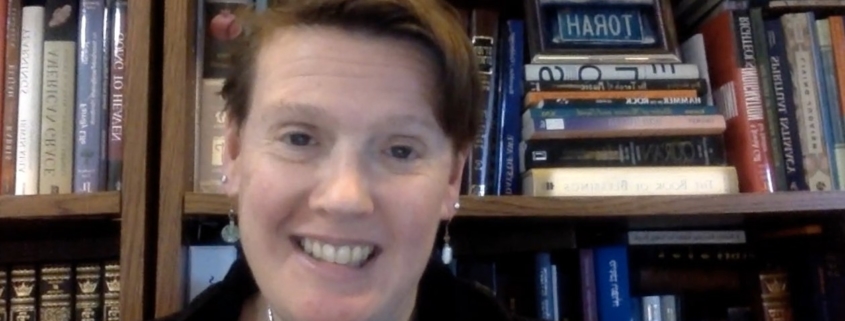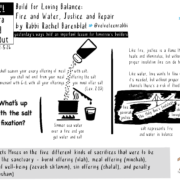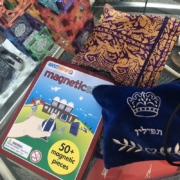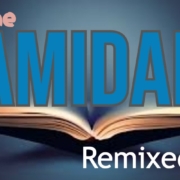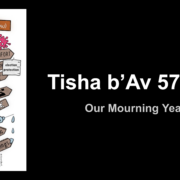Enero 2020: Palabras del Torá / January 2020 Torah video
Palabras del Torá / a “vort” of Torah – R’ Rachel Barenblat from Bayit: Building Jewish on Vimeo.
Each month Bayit offers regular video “vorts” (words of Torah / teachings from Jewish tradition) offered in or translated into Spanish, designed for Cuban Jewish communities and available to Spanish-speaking Jews everywhere. This month’s video offering features a teaching from Rabbi Rachel Barenblat, translated into Spanish by Rabbi Juan Mejia. The text follows, in Spanish and then in English.
¡Shalom javerim y buenos días amigos! El mes pasado celebramos la fiesta de Januká. El próximo mes nos traerá Tu Bishvat, también conocido como el “año nuevo de los árboles”. Pero Enero es un mes en espera. Un festival ya pasó y el otro todavía no ha llegado.
Esta pausa entre fiestas es parte de nuestra vida espiritual también. Nuestra vida espiritual no consta sólo de experiencias cumbre cuando la comunidad se reune para las fiestas o una celebración. Por supuesto que éstas también son parte de nuestra vida espiritual. Pero los tiempos tranquilos, los tiempos de espera también son parte de nuestra vida espiritual.
La vida judía – como toda vida espiritual- tiene un ritmo natural de avance y retroceso. En hebreo decimos “ratzó vashov”. La vida espiritual avanza y retrocede como la marea. Tanto la marea alta como la baja son parte del ritmo natural del mar. Igualmente, las cimas y los tiempos tranquilos son igualmente parte del ritmo natural de la vida espiritual.
Amo a nuestras fiestas y los rituales que las acompañan. Pero también amo los tiempos tranquilos. Estos me recuerdan que puedo encontrar santidad y apoyo en las pequeñas tareas que forman parte de mi día a día. Estas pequeñas prácticas son parte de las herramientas que la tradición nos ofrece para construir vidas judías con sentido.
Creo que es importante que estas prácticas no nos exigen venir a un sitio especial, o usar objetos especiales o incluso hablar en hebreo. Somos judíos donde quiera que vayamos, no sólo en la sinagoga. Somos judíos sin importar en qué lenguaje estemos hablando o rezando.
Acá les presento mis dos prácticas favoritas. Estos son sus textos y las melodías que las acompañan. Pero creo que lo más importante, más que las palabras o la música, es el movimiento del corazón. Estas son dos de las herramientas esenciales de mi caja de herramientas espiritual.
La primera de ellas es agradecer a Dios al despertarme. Hay una oración tradicional para este fin llamada el Modé Aní. Esta se encuentra al comienzo de la mayoría de los libros de oración / siddurim: “Te agradezco, mi Dios vivo y duradero, por haberme devuelto mi alma. Grande es tu fidelidad.”
Amo esta oración porque me recuerda que estar vivo es un regalo. Y me recuerda que aunque puedo haber cometido errores ayer, Dios tiene fe en mí para ser mejor hoy. Amo la idea de que del mismo modo que buscamos tener fe en Dios, también podemos creer que Dios tiene fe en nosotros.
Si no conoces las palabras tradicionales, o estas no resuenan contigo, puedes adoptar esta práctica con las palabras de tu propio corazón. Cuando te despiertes en la mañana, toma un momento para cultivar un sentimiento de gratitud. Una vez esto se volvió un hábito para mí, hizo mis mañanas más luminosas.
Recitar el Shemá antes de dormir es otra herramienta espiritual para el tiempo corriente. Primero hacemos una pausa y meditamos sobre nuestro día. Resolvemos mejorar mañana y dejamos ir los errores y afanes del día- tanto los propios como los ajenos.
Y después decimos el Shemá, un recordatorio de la unidad de Dios y un recordatorio de que somos parte de la unidad del Universo. Hacer esto todas las noches es una forma de mantenimiento espiritual diario para el alma. Y, en mi opinión, también me ayuda a conciliar el sueño más rápido. Mi corazón se aligera.
Amo como estas prácticas en la mañana y en la noche enmarcan mi día. Me ayudan a comenzar y a terminar mi día con un sentimiento de conexión. Y me recuerdan que las cosas pequeñas pueden ser más grandes que la suma de sus partes. A pesar de sólo tomar unos pocos minutos, su impacto es profundo.
Meses como éste, sin grandes fiestas, nos vienen a enseñar (y a recordarnos) que toda la vida es vida espiritual. Meses como estos nos recuerdan que nuestra vida espiritual está compuesta de simples acciones cotidianas. Todo lo que hacemos es parte de nuestra vida espiritual, o puede serlo, si prestamos atención.
Estas pequeñas prácticas diarias son algunas de nuestras herramientas judías para ayudarnos a prestar atención. Nos despiertan, no sólo del sueño físico sino del sueño espiritual. Con ellas podemos construir vidas judías ricas y significativas no sólo durante las fiestas sino siempre.
Shalom chaverim y buenos dias amigos! Last month we celebrated the festival of Chanukah. Next month will bring the holiday of Tu BiShvat, known as the “new year of the trees.” But January is an in-between month. One festival is over and the next has not yet arrived.
This pause between holidays is part of spiritual life too. Spiritual life isn’t only the peak experiences when communities come together for holidays or lifecycle celebrations. Of course those are part of spiritual life! But the quiet times, the in-between times, are also spiritual life.
Jewish life — all spiritual life — has a natural ebb and flow. In Hebrew, we say ratzo v’shov. Spiritual life ebbs and flows like the tide. High tide and low tide are both part of the natural rhythm of the sea. Peak times and quiet times are both part of the natural rhythm of spiritual life.
I love our festivals and the rituals that come with them. But I also love the quiet times. They remind me that I can find holiness and sustenance in small actions that are part of my every day. These small practices are among tradition’s tools for building meaningful Jewish lives.
And I think it’s important that some of these practices don’t require us to come to a special place, to use special items, or even to speak Hebrew. We are Jewish everywhere we go, not just at synagogue. We are Jewish no matter what language we use to speak or to pray.
Here are two of my favorite daily practices. There are texts and melodies that go with them, but I think the movement of the heart is the most important thing, more important than any special words or tunes. These are two of the most essential tools in my spiritual toolbox.
The first one is thanking God when I wake up. There’s a short traditional prayer for this purpose, called Modeh Ani. You can find it in most siddurim / prayerbooks: “I am thankful before You, living and enduring God. You have restored my soul to me; great is Your faithfulness!”
I love this prayer because it reminds me that being alive is a gift. And it reminds me that even if I feel like I made mistakes yesterday, God has faith that I can be my best self today. I love the idea that just as we seek to have faith in God, we can also believe that God has faith in us.
If you don’t know the traditional words, or if they don’t speak to you, you can do this practice with the words of your own heart. When you wake up in the morning, just pause and cultivate a sense of gratitude. Once this became a habit for me, it made my mornings feel brighter.
Saying the Shema before sleep is another spiritual tool for ordinary time. First we pause before bed, and reflect on the day. We resolve to do better tomorrow, and try to let go of the day’s hurts and mistakes — both mistakes we made ourselves, and mistakes made by others.
And then we say the Shema, a reminder of the Oneness of God and a reminder that we are part of the great unity of the universe. Doing this every night is a form of daily spiritual soul-maintenance. And I think it helps me fall asleep more easily, too. My heart feels lighter.
I love how these morning and evening practices bookend my day. They help me begin and end each day with a sense of connection. And they remind me that little things can add up to more than the sum of their parts. They take only a few minutes, but their impact is deep.
Months like this one, with no big holidays, come to teach us (and then to remind us) that all of life is spiritual life. Months like this one remind us that spiritual life is made up of simple everyday actions. Everything we do is part of spiritual life… or can be, if we pay attention.
And these small daily spiritual practices are some of our Jewish tools for helping us pay attention. They help us wake up: not just from literal sleep, but from spiritual sleep. With them we can build Jewish lives that are meaningful and deep: not only at holiday times, but always.

By Rabbi Rachel Barenblat. Translated by Rabbi Juan Mejia.

